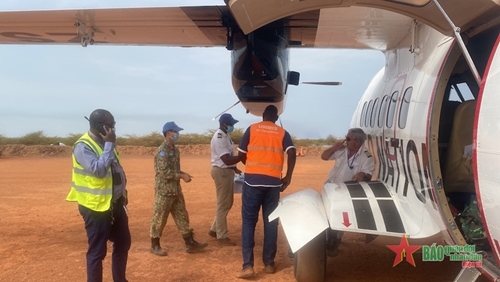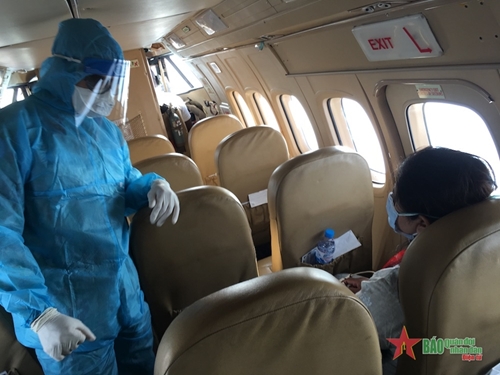   |
 |
|
AMET members and the flight crew prepare for transferring the patient. |
Upon receiving the direction from the Chief Medical Officer of the United Nations Mission in South Sudan (UNMISS), Senior Medical Officer of Vietnam’s L2FH Rotation 3 Major Tran Dang Khoa consulted with head of the Department of Internal Medicine - Infectious Diseases Captain Mai Dinh Thanh and the hospital’s AMET. After that they decided to assign the AMET to transfer the patient to Juba city for treatment.
Taking on the mission, the AMET members including Senior Lieutenant Dinh Van Hong and non-commissioned Sr. Lt. Huynh Van Khanh swiftly transported the patient while strictly observing COVID-19 prevention and control measures.
According to Sr. Lt. Dinh Van Hong, the patient, a female staff of the United Nations High Commissioner for Refugees (UNHCR), showed symptoms for five days. She felt tired and difficult to breathe and received no treatment.
After receiving the news, the Vietnamese AMET tried their best to reach the patient as soon as possible.
“Right after the aircraft landed, we gave first aid to the patient on the spot, measured the oxygen saturation (SpO2) at 90%, gave her oxygen, reassured and encouraged her before transporting her to the plane,” said Doctor Hong.
The Vietnamese officer added that, during the flight, the patient showed signs of fatigue and shortness of breath. Luckily, AMET members could handle them in a timely manner. The patient was then handed over to the Indian hospital safely.
This is the first time the Vietnamese field hospital has transported a COVID-19 patient to a place far from Bentiu where they are stationed.
In Bentiu, AMET always stays ready to fly patients, especially in rainy season when it is difficult for a drive due to bad conditions of roads in South Sudan. However, the airfields in Bentiu and adjacent areas are still rudimentary, with small and short runways, posing high risks of un-safety for flights, especially during big flooding which often inundates the runway, causing difficulties for patient transfer.
    |
 |
|
An AMET member encourages the patient before the aircraft takes off to Juba city. |
In nine months taking on duties at UNMISS, the AMET of the Vietnamese L2FH Rotation 3 has overcome difficulties, conducted aero-medevac for 15 patients, nearly equaling the number of cases handled by the two previous AMETs of Vietnam. Some patients suffered from serious illnesses, such as acute myocardial infarction, cerebral hemorrhage, and gastrointestinal hemorrhage. However, with their professional expertise and many years of experience, members of the AMET of Vietnam’s L2FH Rotation 3 have excellently completed their assigned duties, receiving high appreciation from UNMISS Chief Medical Officer and other units of UNMISS.
Reported by Tien Phuc from Bentiu, South Sudan
Translated by Mai Huong